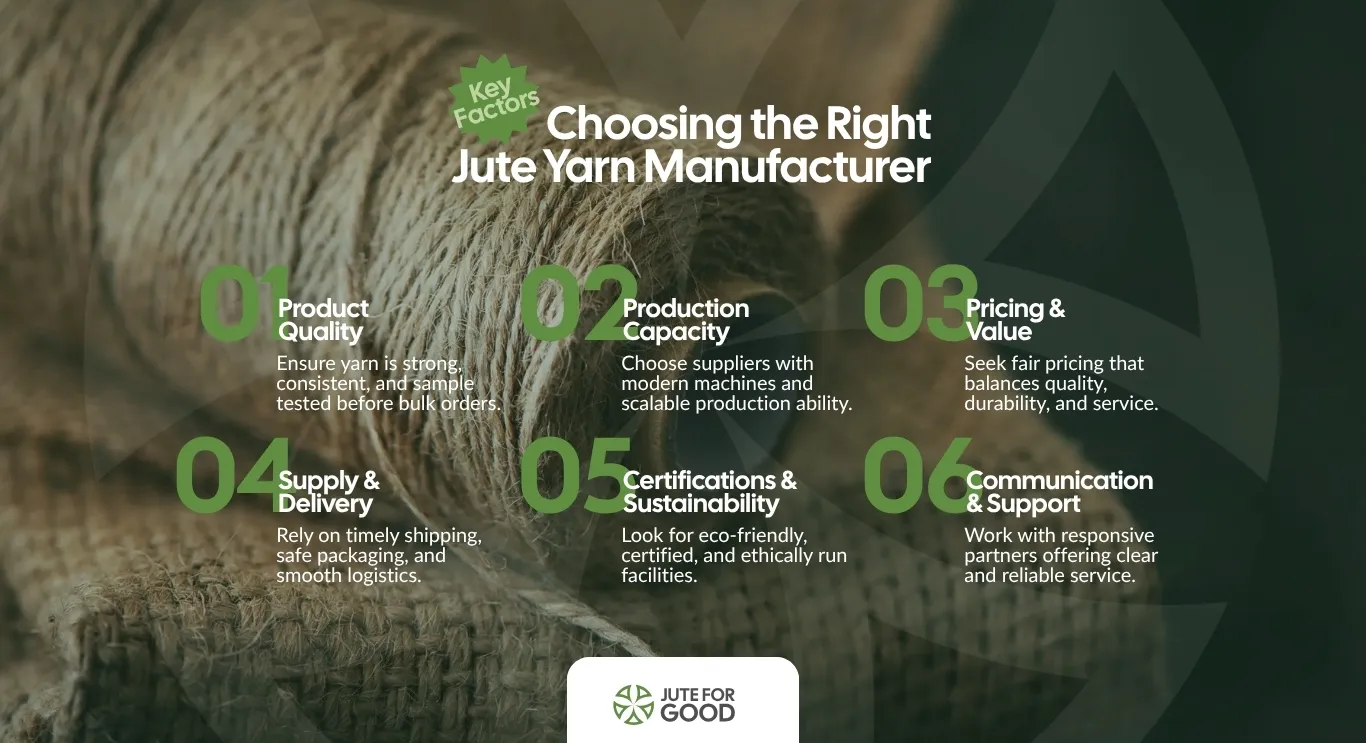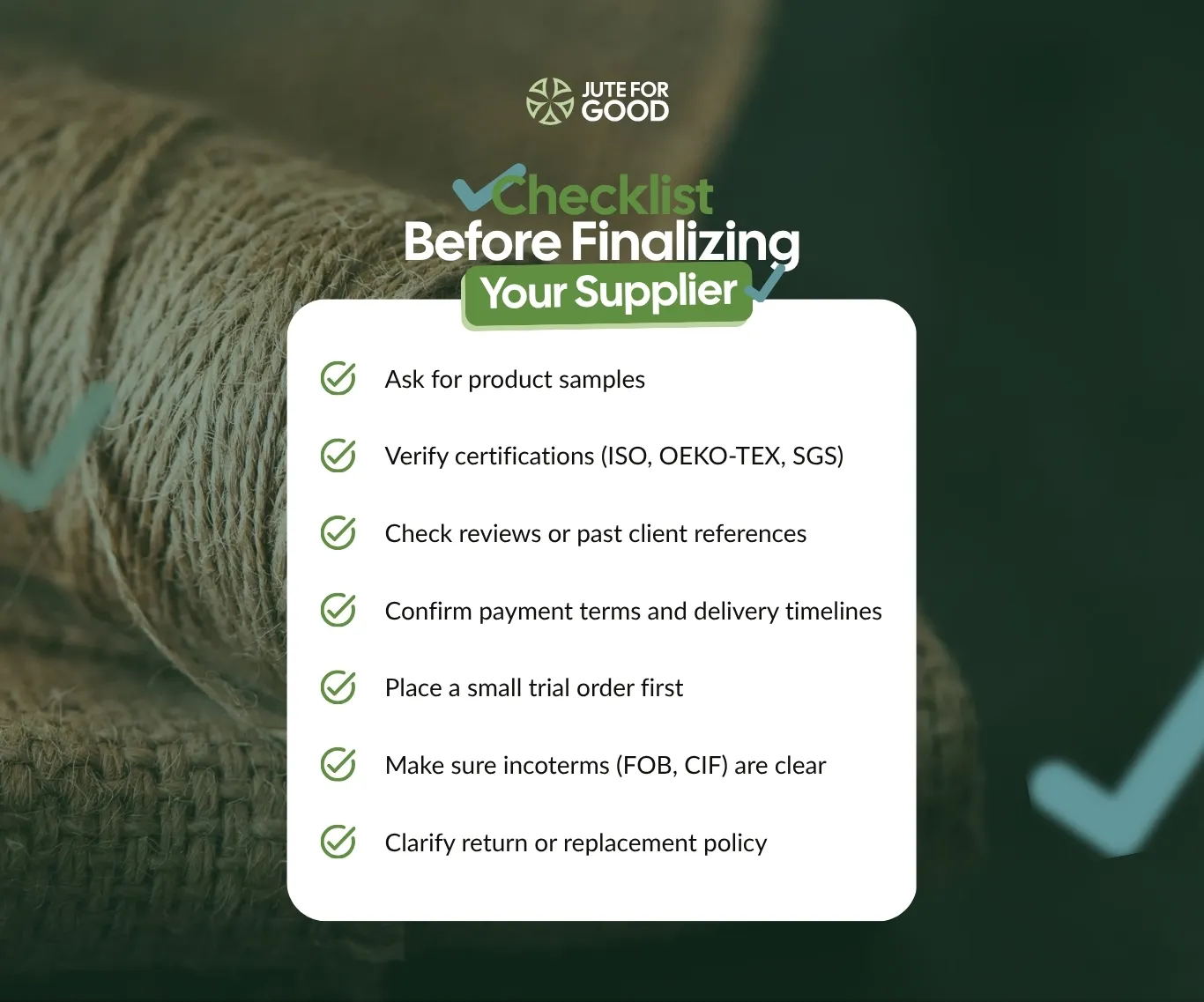Jute yarn is one of the most used natural fibers in the world. It is strong, eco-friendly, and low-cost. Businesses use jute yarn to make ropes, sacks, rugs, and many other products. Because of this, demand for jute yarn is growing every year.
But finding the right jute yarn manufacturer is not easy. Many buyers face problems such as poor quality yarn, late delivery, or hidden charges. These issues can harm a business and increase costs.
This guide will help you learn how to choose the best jute yarn manufacturer. You will know what to check, where to find suppliers, and how to compare them.
Why Choosing the Right Manufacturer Matters
The choice of manufacturer is not just about getting yarn. It affects the whole supply chain of your business. If the yarn is weak, your final product will be weak too. If the supplier delays shipping, you may lose buyers or miss seasonal demand. A reliable manufacturer protects your brand reputation and helps you grow.
Problems with the wrong supplier:
- Low-quality fiber: Yarn that breaks or sheds easily makes your product unsafe and reduces customer trust.
- Inconsistent thickness and color: Buyers want uniformity. Yarn that changes in shade or size can spoil an entire production batch.
- Late shipments: Missing deadlines means you lose sales opportunities, especially in export markets where timing is strict.
- Hidden costs: Some suppliers give a low price first but add packaging, freight, or tax later. This increases your budget unexpectedly.
- Poor communication: Lack of updates or unclear terms can create confusion and delays.
Why you need a reliable manufacturer:
- Quality control: A strong supplier uses skilled labor, modern machines, and strict checks to keep yarn quality stable.
- Certification: International certificates like ISO, OEKO-TEX, and SGS show the supplier follows global safety and quality rules. This makes it easier to sell in Europe, USA, or the Middle East.
- Sustainability: Today’s global buyers want eco-friendly materials. A responsible manufacturer uses natural fibers, reduces waste, and follows green production practices.
- Reputation and trust: Working with a well-known supplier builds confidence for your customers. It shows you care about quality and reliability, not just low cost.
- Long-term partnership: A good supplier grows with your business. They can increase capacity, give flexible terms, and support you during high demand seasons.
Key Factors to Consider When Selecting a Jute Yarn Manufacturer

When choosing a jute yarn supplier, you need to look beyond price. Many small details decide if the manufacturer will support your business growth or cause you trouble. Here are the most important factors:
1. Product Quality and Specifications
Quality is the heart of jute yarn.
- Yarn count and twist: Decide strength, softness, and end use.
- Fiber grade: Long, golden fibers make stronger, smoother yarn.
- Consistency: Every batch must match the last one in color and size.
- Customization: Some buyers need special counts or colors. A good supplier should be able to meet this.
Tip: Always request samples before placing bulk orders.
2. Production Capacity and Technology
Production power shows how well the manufacturer can serve you.
- Capacity: Can they supply large volumes on time?
- Technology: Modern spinning machines give smoother finish and less waste.
- Scalability: If your demand grows, can they grow with you?
- Skilled workforce: Experienced workers handle fibers better.
3. Pricing and Value
Cost is important, but lowest price is not always best.
- Transparent pricing: Make sure there are no hidden costs.
- Comparison: Compare price with quality and service.
- Fair balance: Slightly higher price can mean better strength, longer product life, and fewer complaints.
4. Supply Chain and Delivery
Delivery delays can kill your business deals.
- On-time record: Check their past shipment record.
- Logistics support: Good suppliers handle customs and export paperwork.
- Storage & packaging: Yarn should be packed properly to avoid moisture damage during shipping.
5. Certifications and Sustainability
Certifications prove that the supplier follows global rules.
- ISO / OEKO-TEX / SGS: These show product safety and environmental care.
- Eco-friendly process: Buyers in Europe and the USA prefer sustainable yarn.
- Worker welfare: Ethical practices add trust and brand value.
6. Communication and Customer Support
A good manufacturer treats you like a partner.
- Responsiveness: Quick replies to questions and changes.
- Clarity: Clear contracts and payment terms, no hidden language.
- After-sales support: If something goes wrong with a batch, they should help solve it fast.
Where to Find Reliable Jute Yarn Manufacturers
Finding the right supplier depends on where you search and how carefully you verify them. Here are the main sources:
1. Bangladesh: The Global Hub
Bangladesh is the world’s largest jute producer. Cities like Dhaka, Khulna, and Chattogram are filled with factories and exporters. Many global brands source directly from Bangladeshi mills because:
- Fibers are long and strong.
- Prices are competitive for bulk orders.
- Export systems are well-established.
2. India: Tradition and Variety
India, especially West Bengal and Kolkata, has a long history of jute production. Indian suppliers often provide a wide variety of yarn types, including blended yarns. Local artisans and industries depend heavily on these suppliers.
3. Trade Fairs and Exhibitions
Events like Dhaka International Yarn & Fabric Show or India International Textile Machinery Exhibitions are good places to meet suppliers face-to-face. Trade shows let you:
- Touch and check samples directly.
- Compare different suppliers in one place.
- Negotiate prices and build trust faster.
4. B2B Portals
Online platforms like Alibaba, TradeIndia, and IndiaMart list hundreds of suppliers. These are useful for buyers outside South Asia.
- Easy to compare multiple suppliers.
- Reviews and ratings give quick insight.
- Helpful for small trial orders.
But beware: Some listings may not be direct factories. Many are middlemen. Always verify before placing bulk orders.
5. Direct Factory Sourcing
For large buyers, contacting factories directly is the most cost-effective option.
- You get wholesale pricing without agents.
- Better control over quality and packaging.
- Stronger long-term partnerships.
Comparing Bangladesh vs India for Jute Yarn
Both Bangladesh and India are leading in jute yarn. But they have some differences.
| Feature | Bangladesh | India |
| Fiber Quality | Long, strong, fine fibers | Medium to coarse, wider variety |
| Price | Competitive, lower cost | Often higher due to local demand |
| Capacity | High export capacity | Balanced export and domestic market |
| Reputation | Leading exporter worldwide | Traditional expertise in jute |
| Best For | Bulk buyers, global brands | Domestic supply, artisans, diverse needs |
Checklist Before Finalizing Your Supplier

Before you sign any deal, go through this checklist to avoid surprises later:
- Ask for product samples: Samples help you judge yarn strength, color, and finish before investing in bulk.
- Verify certifications (ISO, OEKO-TEX, SGS): These prove the yarn is safe, eco-friendly, and meets international trade standards.
- Check reviews or past client references: Talk to other buyers if possible. A supplier with a strong record is more trustworthy.
- Confirm payment terms and delivery timelines: Make sure payment schedule and delivery dates are clearly written in the contract.
- Place a small trial order first: This lets you test quality, packing, and shipping reliability without big risk.
- Make sure incoterms (FOB, CIF) are clear: Shipping terms decide who pays for freight, insurance, and customs. Misunderstanding this can cost you extra.
- Clarify return or replacement policy: If goods arrive damaged or not as promised, you should know your rights in advance.
Pro Tip: Keep all agreements in writing, not just verbal promises. This avoids confusion if issues arise later.
Common Mistakes to Avoid
Many buyers lose money because they skip important steps. Avoid these mistakes:
- Choosing only the lowest price option: Cheap yarn often means poor quality or hidden costs later.
- Ignoring certifications and sustainability: Without certifications, your products may be rejected in export markets.
- Not checking supplier’s bulk capacity: Some suppliers can handle small orders but fail with large shipments.
- Overlooking hidden costs: Shipping, taxes, and packing charges can raise the final cost much higher than expected.
- Skipping trial orders: Going straight to bulk purchase without testing quality is a risky step.
- Not clarifying refund or return policies: Without clear rules, you may lose money if the order is defective.
Pro Tip: Always think long-term. A reliable supplier may not be the cheapest today, but they save you money and stress in the future.
How Jute For Good Helps Buyers
If you are looking for a trusted supplier, Juteforgood is here to help.
Why choose Imperial Jute?
- High-quality long-fiber jute yarn from Bangladesh.
- Bulk capacity with modern spinning technology.
- Competitive prices with no hidden costs.
- Certified production process (eco-friendly and export-ready).
- Fast and reliable shipping worldwide.
- Strong customer support for long-term partnerships.
Contact Juteforgood today for free samples and quotes.
Conclusion
Choosing the right jute yarn manufacturer is an important decision for your business. A good supplier ensures strong, eco-friendly yarn, on-time delivery, and fair pricing. Bangladesh and India are leading producers, but Bangladesh often offers better value for global buyers.
Take your time, follow the checklist, and avoid common mistakes. When you find the right partner, your supply chain becomes smoother and your products gain trust in the market.
